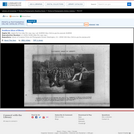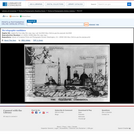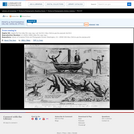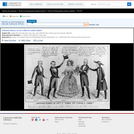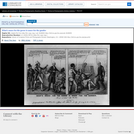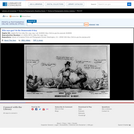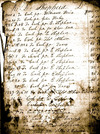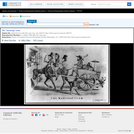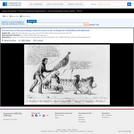
A bitter vilification of the Van Buren administration's use of bloodhounds to hunt fugitive Indians during the Second Seminole War in Florida. The artist condemns the racism and inhumanity of the measure, as well as the role of editor Francis Preston Blair as apologist for the administration. The War Department under Secretary Joel Poinsett was accused of ineptness and cruelty in its conduct of the war--a costly and protracted campaign to subjugate and remove the Seminole Indians from tribal lands in Florida. Public and congressional indignation was stirred in February and March 1840 when the Cuban bloodhounds were first introduced. (The cartoon may date from this time or from as early as 1838 when the idea was first suggested to commanding general Zachary Taylor by Poinsett.) The use of dogs particularly enraged abolitionists, who believed that the animals were really intended for hunting runaway slaves. In the cartoon Poinsett presents a flag that bears the image of an Indian's head carried by a dog. Francis Preston Blair, on his knees, shows the troop of hounds a map of Florida. Blair: "I take pleasure in pointing out to you, my "brethren-"in-arms the seat of a war, the honour of terminating which our master has put in the hands of "our" race. I have no doubt you will all prove like myself--good "collar" men in the cause." Blair's use of the term "collar men" evokes the old colloquialism "collar presses" as a reference to newspapers friendly to the Democratic administration. Poinsett says: "Fellow citizens & soldiers! In presenting this standard to the 1st Regiment of Bloodhounds, I congratulate you on your promotion, from the base & inglorious pursuit of animals, in an uncivilized region like Cuba, to the noble task of hunting "men" in our Christian country! our administration has been reproached for the expense of the Florida war, so we have determined now to prosecute it, in a way that's "dog cheap!" Hence in your "huge paws!" we put the charge of bringing it to a close. Be fleet of foot and keen of nose, or the Indians will escape in "spite" of your "teeth! Dear Blair" here, shows you a map of Florida the theatre of your future deeds. Look to him as the trumpeter of your fame, who will emblazon your acts, as far as the 'Globe' extends, He feels great interest in all his Kith & Kin,' and will therefore transmit your heroism, in "dog"grel verse to remotest posterity!"|Printed & pub: by H.R. Robinson, no. 52 Cortlandt St. N.Y. & Pennsa Avenue Washington D.C.|Signed: Bow Wow-Wow (probably Napoleon Sarony).|Title appears as it is written on the item.|Weitenkampf, p. 62.|Forms part of: American cartoon print filing series (Library of Congress)|Published in: American political prints, 1766-1876 / Bernard F. Reilly. Boston : G.K. Hall, 1991, entry 1840-5.
- Subject:
- History
- U.S. History
- Material Type:
- Diagram/Illustration
- Primary Source
- Provider:
- Library of Congress
- Provider Set:
- Library of Congress - Cartoons 1766-1876
- Date Added:
- 06/13/2013
